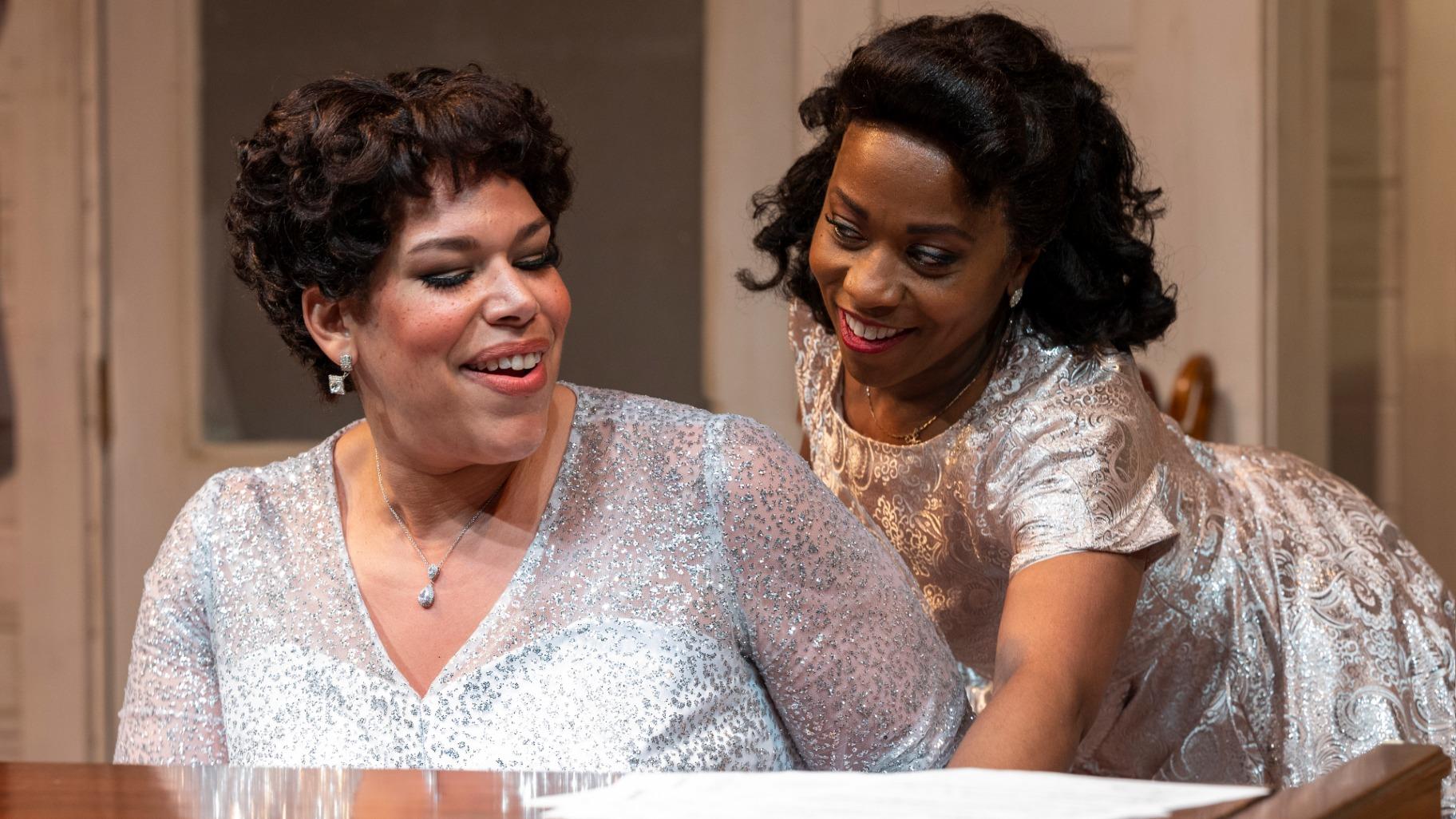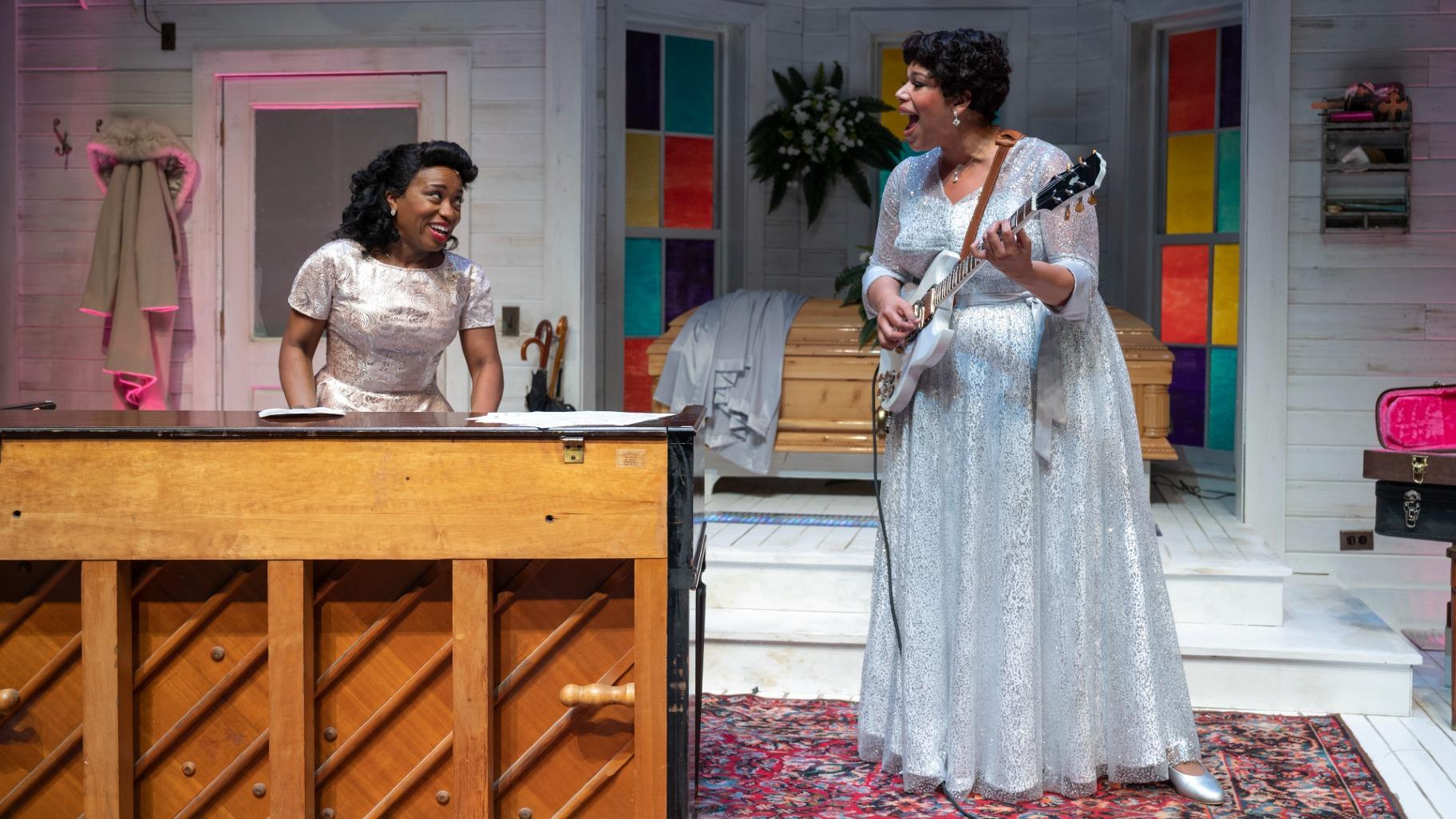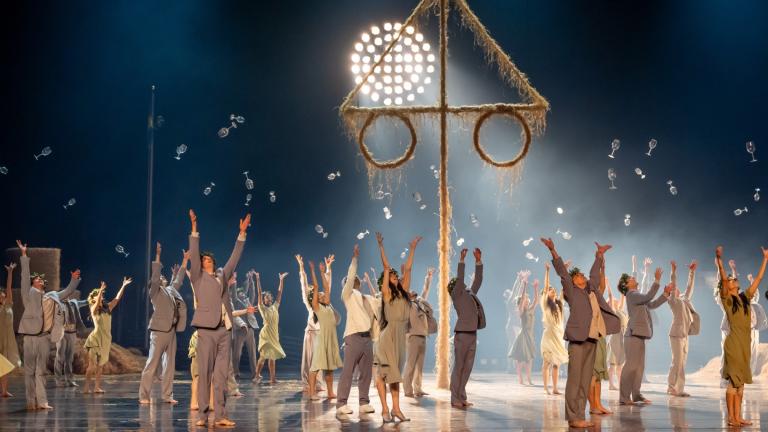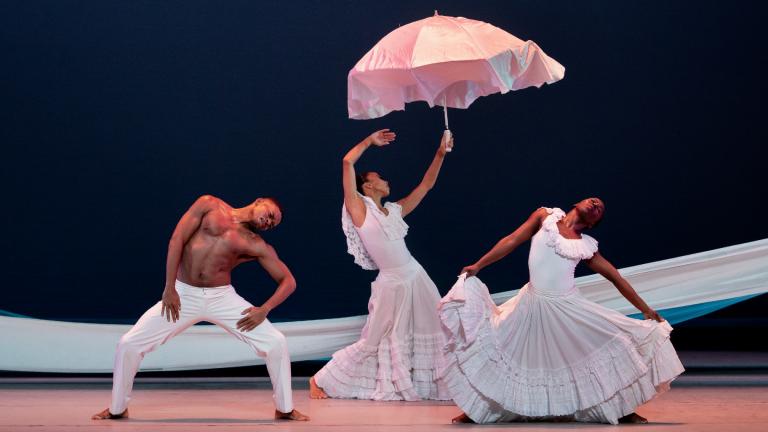 “Marie and Rosetta” at Northlight Theatre. (Michael Brosilow)
“Marie and Rosetta” at Northlight Theatre. (Michael Brosilow)
Here is the recipe for a wonderful musical drama inspired by two immensely gifted but quite different Black women of decades past:
To begin, grab hold of the story of Sister Rosetta Tharpe and Marie Knight — two formidable singer/musicians who joined forces during the 1940s to create a hybrid of gospel, rhythm and blues and even the early elements of rock and roll.
Next, cast Bethany Thomas and Alexis J. Rosten — Jeff Award-winning actresses/singers who are among Chicago’s most charismatic and multitalented performers — in a music-driven play by George Brant, expertly directed by E. Faye Butler (who happens to be another powerhouse actress/singer herself).
And what have you got? “Marie and Rosetta,” a nearly two-hour show (with no intermissions) that captures the evolution of these women’s musical styles and personal relationship in the 1940s, and that kept the audience at Northlight Theatre tapping its feet on opening night. Supplying the superb accompaniment for the two actresses — who only appear to play their instruments and do so with impressive believability — are music director/pianist Morgan E. Stevenson and guitarist Larry Brown. They may remain unseen but are ideally heard from offstage throughout.
Sister Rosetta Sharpe (played by the tall, commanding Thomas, who portrayed a slew of famous singers in Northlight’s production of “Songs for Nobodies” a couple of years ago), is feeling professionally eclipsed by Mahalia Jackson, the singer beloved for her gospel blues style. But then Rosetta takes note of Marie Knight (the petite Roston, who wowed audiences at the Mercury Theater earlier this year as Billie Holiday in “Lady Day at Emerson’s Bar & Grill”), who she catches performing as part of a backup chorus for Mahalia. And Rosetta soon invites Marie to join her on a tour of “the gospel circuit,” although Rosetta has every intention of infusing their programs with a less religious and decidedly sexier and more swinging sound.
 “Marie and Rosetta” at Northlight Theatre. (Michael Brosilow)
“Marie and Rosetta” at Northlight Theatre. (Michael Brosilow)
Hotels in the South at that time were closed to Black people. On their first stop in Mississippi, the two women are invited to stay overnight in a cottage-like funeral parlor in which a spinet piano is surrounded by coffins and a cot that can serve as their beds. (The clever set design is the work of John Culbert). The Chicago-bred Rosetta is determined to expand her audience beyond the church-going crowd and to break free, at least in part, from the gospel style that has made Mahalia such an icon. Rosetta is determined to liberate her performances with R&B rhythms and more, and at one point she even makes the bold move to shift from an acoustic guitar to a newly popular electric one. And she also is determined to liberate Marie, a pianist who is more conservative and church-bred, at least on the surface, and is the mother of young children who are now being cared for by their grandmother in New Jersey.
Rosetta prods Marie to let go and to move with the kind of newfound freedom that she senses is bound to get audiences revved up — and attract those beyond Mahalia’s church-bred fans to the big-time Cotton Club type of crowd.
The rich mix of music (with Marie seated at the piano and Rosetta on guitars) is key to the show, with the women singing a total of about a dozen songs, either solo or together, ranging from spirituals (“This Train,” “Were You There When They Crucified My Lord,” “Sit Down,” “Peace in the Valley”) to the blues (“Looked Down the Line”) to more suggestive early rock and roll-tinged numbers that had an influence on Elvis Presley, Johnny Cash and many others.
All in all, this is the story of personal liberation as achieved through a hybrid of musical styles and the friendship of opposites. There are elements of tragedy in the story, too, which will not be revealed here. And while the timeframe of the work is a bit uneven, that hardly matters given the bravura performances of the two exceptionally talented Chicago actresses who so ideally capture the essence of a real-life collaboration that evolved many years ago.
“Marie and Rosetta” runs through Aug. 6 at Northlight Theatre, 9501 Skokie Blvd., Skokie. For tickets, visit northlight.org or call 847-673-6300.
Note: Northlight has announced an intriguing mixed bag of five shows for its 2023-24 season, including “Birthday Candles” by Noah Haidle; “Dial M for Murder,” adapted from the Frederick Knott original by Jeffrey Hatcher; “Selling Kabul” by Sylvia Khoury; “Brooklyn Laundry” by John Patrick Shanley; and “2 Pianos 4 Hands,” by Richard Greenblatt and Ted Dykstra.
Follow Hedy Weiss on Twitter: @HedyWeissCritic








